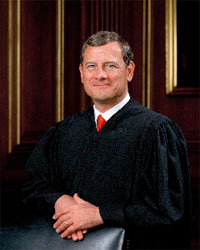Marriage referendum reaches high court

Chief Justice John Roberts (Photo credit: Steve Petteway, Collection of the Supreme Court of the United States)
A lawsuit over a referendum on same-sex marriage has reached the U.S. Supreme Court. And it’s not Proposition 8.
The lawsuit is Jackson v. D.C., an appeal that asks whether the District of Columbia charter (the city’s equivalent to a constitution) can bar voters from considering a ballot measure that would amend the charter in a way that would violate the city’s human rights law.
D.C.’s charter prohibits discrimination based on sexual orientation, and, earlier this year, the city enacted a marriage equality law that enables same-sex couples to obtain marriage licenses the same as straight couples.
A group of eight local anti-gay activists, led by Harry Jackson, have sought to put a referendum on the D.C. ballot to repeal that marriage equality law. The D.C. courts and the city’s Board of Election ruled such a referendum would violate the city initiative laws, which prohibit referenda on matters pertaining to the city’s human rights act.
In March, the anti-gay coalition took a preliminary matter before the U.S. Supreme Court, seeking an emergency stay of the marriage equality law until the referendum issue could be settled in the courts.
Chief Justice John Roberts, who handles emergency petitions from the D.C. Circuit, denied the emergency stay. But in doing so, he added that he thinks the argument Jackson’s group makes about the referendum “has some force,” it just didn’t have a strong basis for an emergency order. Instead, he said, the petitioners would “have the right to challenge any adverse decision through [an appeal to] this Court at the appropriate time”—or after the D.C. Court of Appeals ruled.
Longtime lesbian legal scholar Nan Hunter said Roberts’ remarks amounted to a “hint” that encouraged the Jackson group to come back.
D.C.’s highest court, the D.C. Court of Appeals, ruled in July that the human rights act restriction was consistent with the charter.
And in its new petition, filed October 12 by the right-wing Alliance Defense Fund, the Jackson group argues the D.C. Court of Appeals decision has “left the District’s citizens without immediate recourse on the issue of marriage” and “approved a Council-imposed limitation on the people’s Charter-based initiative power.” The D.C. Council, it argued, approved the human rights act restriction in the city’s initiative laws even though the city counsel’s office advised it that the restriction violated the charter.
D.C.’s charter provides a four-step process by which it can be amended—through a vote of City Council, the signature of the mayor, ratification by voters, and then approval of Congress.
Four justices must agree to hear the appeal before the Supreme Court will schedule it for review. The fact that Roberts has already indicated he thinks the Alliance argument “has some force” suggests he may well vote to take the case and easily pick up three other votes to do so.
“ If any other issue were involved, I think that the Court would be very likely to deny cert, finding that the legal questions presented did not merit highest court review, in part because of their very limited ramifications,” said Hunter. “On gay marriage, though, with four extremely conservative Justices including one who signaled that he was sympathetic, I think all bets are off.” If the court does take the case, however, the court’s opinion would be one not specifically on the point of same-sex marriage. Instead, it would deal with the validity of the D.C. initiative laws prohibiting referenda that implicate the city’s human rights act.
But if this case is lost at the Supreme Court, noted Hunter, Jackson and his group would almost certainly then mount a referendum to repeal D.C.’s marriage equality law.
“The result,” she said, “would amount to an East Coast rerun of Prop 8, with issues of religion and race foregrounded.”


The sooner the issue of marriage equality for law-abiding, taxpaying Gay Americans gets to the Supreme Court, THE BETTER as far as I’m concerned. Laws need to apply equally to all people at stake. If the electorate wants to make something illegal, it ought to be illegal for ALL people. You can’t have the heterosexual majority saying, “WE get to marry. YOU do not.” Such a double standard is clearly unconstitutional under the 14th Amendment.
If one group can force laws that violate human rights in DC then ANY group can do the same. Jackson better consider what he’s asking for and who may well be next on the chopping block.
Here’s hoping the DOMA case goes our way.
Marriage laws apply equally to both genders (there are only two).
Govt is only concerned that the two gender forms are present. No license asks about sexual function, motive, or orientation.
>GERRY
>October 22, 2010 at 3:48 pm | Permalink
>Marriage laws apply equally to both genders (there are only two).
Not in all states!!!!!